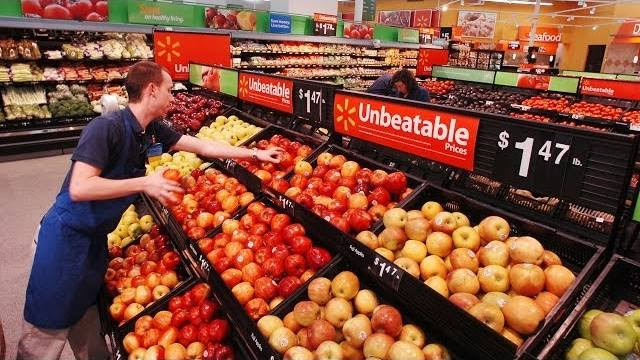Out on the mean streets of the U.S. organic foods industry, Walmart has stepped onto the corner with both guns drawn. On Thursday, the superstore behemoth announced its plan to partner with Wild Oats (which you may recognize as a former subsidiary of Whole Foods) to offer a line of organic goods at unprecedentedly low prices in 2,000 of its U.S. stores. To start, the line will offer primarily canned goods and other pantry staples that will cost up to 25 percent less than those of other organic brands.
At first blush, this appears to be great news. Cheaper, more accessible organic food — isn’t that one of the prerequisites for the kind of healthy food system we’ve all been waiting for? The New York Times notes that Walmart’s big move could ultimately create a larger supply of organic goods, pushing down organic prices in the long run.
From The New York Times:
“We’re removing the premium associated with organic groceries,” said Jack L. Sinclair, executive vice president of Walmart U.S.’s grocery division. The Wild Oats organic products will be priced the same as similar nonorganic brand-name goods.
If that sounds suspicious to anyone familiar with organic growing practices, it should. For those not as well-versed, we’re here to help! We spoke with Coach Mark Smallwood, executive director of The Rodale Institute in Kutztown, Penn., about how Walmart could manage to offer such low prices, and what that might mean for organic farmers across the country.
Smallwood explains that the concept of a “premium” associated with organic food is misleading, because the price of an organic good reflects the true cost of its production.
“The issue is that there aren’t the subsidies available to organic farmers that there are [for conventional farmers.] So there’s a question in my mind about how Walmart is going to pull this off and be able to make profit,” Smallwood said. “And for them to even come out and make that statement before they’ve started is a huge question mark. Somebody’s going to have to pay, and my hope is that it’s not the organic farmer.”
Smallwood also shared his concern that if Walmart were to incentivize large-scale organic production, industrial organic practices would become more widespread. In this model, farmers adhere to just the bare minimum of organic standards and ultimately end up depleting soil health on a piece of land, abandoning it, and moving on to another.
“Will a large agricultural operation come in and buy up tens of small family farms and put them all under one name, and then create that slash-and-burn model?” Smallwood said. “That’s what I’m afraid of. That’s the [possible] downside.”
3 Steps To Join #FowlerNation!
1. Subscribe To The Fowler Show:
http://bit.ly/SubscribeFowlerNation
2. ‘Like’ The Richard Fowler Show on Facebook
http://www.facebook.com/RichardFowler…
3. ‘Follow’ Us on Twitter
http://www.twitter.com/fowlershow
These Patrons make the Fowler Show possible ($20+ monthly donation on Patreon.com/FowlerShow) & we couldn’t do it without them!
Truthservers.com
Are you a fan of The Fowler Show? Become a Patron & help support independent media! Learn more here:
http://www.patreon.com/fowlershow
Want to help out but don’t have any money to donate? Donate your account & help us get our stories out on social media. Learn more here:
http://www.donateyouraccount.com/fowl…
If you liked this clip, share it with your friends and hit that “like” button!
1,500 Subscriber Behind The Scenes Reward Video –
http://www.youtube.com/watch?v=LT9x1P…
Subscribe to our Podcast on iTunes for free!
https://itunes.apple.com/us/podcast/t…
@fowlershow
@richardafowler
http://www.facebook.com/richardfowler…
http://www.fowlershow.com
http://fowlershow.tumblr.com/

